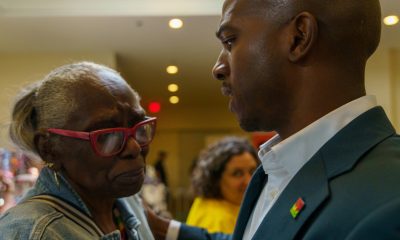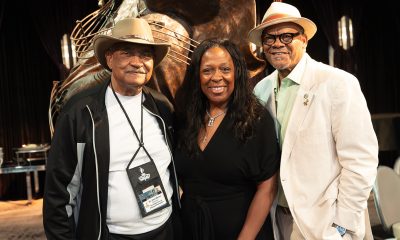Berkeley
Your Taxes, Cash Flow and COVID-19 Crisis: an Interview With BOE Chair Malia Cohen

A little over one year ago, members of the California Board of Equalization (BOE) unanimously selected Malia M. Cohen, former president of the San Francisco Board of Supervisors, to chair the 141-year-old state agency.
Cohen made history when she became the first African-American woman elected to the Board of Equalization in November of 2018. She is also the first Black woman to serve as chair of the Board of Equalization, the agency responsible for administering California’s $70 billion property tax system.
In her role, Cohen represents nearly 10 million constituents residing in 23 counties in Northern and Central California, extending from Del Norte County in the north to Santa Barbara County in the south.
She’s the youngest constitutional officer serving in California.
Our interview with Cohen is one of several we will have with state officials from all backgrounds. What they share with us will help keep African Americans in California up to speed with important news coming out of government that has direct impact on our lives, money, health and civil rights.
Our goal is to help close the information gap that exists between our community and other groups throughout our state.
California Black Media (CBM): The coronavirus pandemic is clearly impacting the economy. Just how bad is it?
Malia Cohen (MC): It’s bad. The pandemic has turned all of our lives upside down. Just this week, the governor announced that over 1.6 million Californians have filed for unemployment because of the pandemic. Many more will file in the weeks to come. State and local governments will lose revenue needed to maintain vital services. It is a true financial crisis.
CBM: How are our elected leaders responding to this financial crisis?
MC: Our African-American elected leaders in California’s Congressional delegation — Sen. Kamala Harris and congresswomen Maxine Waters, Barbara Lee, and Karen Bass — have been working overtime to provide financial assistance. W are fortunate to have our own Congresswoman Maxine Waters serving as chair of the House Financial Services Committee and Congresswoman Karen Bass serving as the chair of the Congressional Legislative Black Caucus. In the coming days, I look forward to working with these remarkable African American leaders to provide direct communication about financial relief for our community. One way will be through telephone town halls and community press communications just like this.
CBM: What can be done to assist persons who are suffering financially as a result of the pandemic?
MC: Action has already been taken to delay the date for filing and payment of income taxes to the IRS and the California Franchise Tax Board. The traditional tax day deadline of April 15 has been extended to July 15. Individual taxpayers seeking information about their own filing requirements can call the IRS at 1-800-829-1040 and businesses can call 1-800-829-4933. For the California Franchise Tax Board, taxpayers can call 1-800-852-5711.
CBM: What help is coming for a person who just needs money to live on?
MC: Congress also approved payments of up to $1,200 for individuals and $2,400 for married couples, and $500 for each qualifying child. These funds will be sent to everyone who filed federal income taxes for either 2018 or 2019, and has an income under $75,000 for individuals and up to $150,000 for married couples. These checks will be reduced by $5 for every $100 above the $75,000 and $150,000 thresholds. Single filers with incomes over $99,000 and $198,000 for couples are not eligible.
CBM: How are the checks going to be distributed?
MC: They are going to be sent out via direct deposit to bank accounts.
CBM: What if the IRS does not have my direct deposit information, or if I have moved?
MC: According the IRS website, “In the coming weeks, Treasury plans to develop a web-based portal for individuals to provide their banking information to the IRS online, so that individuals can receive payments immediately as opposed to checks in the mail.”
CBM: What about folks who usually don’t file tax returns, and can they get a check?
MC: According to the IRS, the website irs.gov/coronavirus is going to publish information about how to file for these coronavirus economic impact checks even if you have not filed a tax return in 2018 or 2019.
CBM: Do you have any other suggestions for persons who need relief?
MC: Yes. Please remember to file for the California Earned Income Tax Credit (EITC) and the Young Child Tax Credit if you or your family are eligible. Here’s how to file. If you have taxable earned income under $30,000, you can file and receive up to $240 if you have no children. If you have one child, the credit could be as high as $1,605. If you have three or more children, the credit rises to $2,982. In California, a taxpayer files Franchise Tax Board Form 3514 California Earned Income Tax Credit along with your state income tax return. To get a copy of Form 3514, go to the Franchise Tax Board website, ftb.ca.gov. Click on “Forms” in the top right of the website. Then, under “Get forms, instructions, and publications” click “Online.” On the next page, where it says “Form Number and/or Keywords” type in 3514. That will take you to the form for filing the California Earned Income Tax Credit.
Also, you may qualify for the federal IRS Earned Income Tax Credit. To qualify, you must file an income tax return with the IRS (Form 1040), and also be within income guidelines. If you have children, you attached “Schedule EIC” to your Form 1040. To get more information, go to the IRS website, irs.gov, click on “Credits and Deductions” at the top of the page. Then click on “Earned Income Credit (EITC).”
CBM: What about financial assistance for small businesses?
MC: Congress just passed a $349 billion paycheck protection program, which provides loans to small businesses to help them keep their workers on payroll. This is one way to help businesses so that they do not have to lay off their employees. Every eligible small business should consider taking advantage of this program.
CBM: Where can people get information about this program?
MC: Go to the website treasury.gov/cares and click on “Assistance for Small Business.”
CBM: What if I run a small business and can’t get together my California Sales Tax filing because of the governor’s stay-at-home order?
MC: Businesses affected by the coronavirus can request relief of interest or penalties or request an extension for filing a return by going to the California Department of Tax and Fee’s website: CDTFA.ca.gov. Go to the “Alert!” banner at the top of the page, and click on “Learn more” after the sentence, “CDTFA is able to make it easier for taxpayers to request relief.” Or, taxpayers can call: 1-800-400-7115.
CBM: Will taxpayers still have to pay their property taxes on April 10th?
MC: The April 10th deadline is fixed in statute. Only San Francisco has extended the deadline to May 4 due to the shelter-in-place order in effect in San Francisco. Local county tax collectors can relieve penalties and interests if they determine that failure to make timely payment is due to reasonable cause and circumstances beyond the taxpayer’s control. Taxpayers would have to file for relief of penalties and interest with their county tax collector. I certainly hope that tax collectors are willing to grant relief to all who are impacted by the coronavirus and the stay-at-home orders.
CBM: How do we contact you if we need help?
MC: We are always eager to help. Call and leave me a message at 415-557-3000 or email me at MaliaCohen@boe.ca.gov and we will get back to you as soon as we can. My website at www.boe.ca.gov/Cohen has many helpful resources or you can follow me on Facebook or sign up for my newsletter to receive updates.
Note: Complex tax laws and concepts were discussed in this interview. It may not address every situation and is not considered written advice. Changes in law or regulations may have occurred since the time this news release was written. If there is a conflict between the text of this news release and the law, decisions will be based upon the law and not this news release.
Arts and Culture
Farwest Region Deltas Celebrate Centennial With “September Breakfast” Honoring Vivian Osborne Marsh
The region was established in 1925 under the leadership of Vivian Osborne Marsh, who became its first Regional Director. Marsh was a pioneering scholar and civic leader, earning recognition as the first Black woman to receive both a bachelor’s and a master’s degree in anthropology from UC Berkeley.

By Antoinette Porter
Hundreds of members of Delta Sigma Theta Sorority, Inc., and their guests gathered at the Martin Luther King Jr. Student Union at the University of California, Berkeley, to mark the 100th anniversary of the sorority’s Farwest Region.
The region was established in 1925 under the leadership of Vivian Osborne Marsh, who became its first Regional Director. Marsh was a pioneering scholar and civic leader, earning recognition as the first Black woman to receive both a bachelor’s and a master’s degree in anthropology from UC Berkeley.
Marsh went on to serve as Delta Sigma Theta’s 7th National President, where she launched the sorority’s National Library Project to expand access to books in underserved Black communities in the South. During her presidency, the organization also became a prominent voice in the civil rights movement, lobbying Congress to pass anti-lynching legislation.
Bak in the Bay Area, Marsh devoted her career to advancing educational opportunities, mentoring young people, and strengthening community life. That commitment continues to shape the region, which supports initiatives in education, social justice, and economic development. Current projects include raising scholarship funds for students at Historically Black Colleges and Universities, voter education campaigns, and health and wellness programs.
A century after its founding, the Farwest Region of Delta Sigma Theta remains active across California and other western states, carrying forward Marsh’s vision of service and advocacy.
Arts and Culture
Cal Performances Presents Angélique Kidjo & Yo-Yo Ma in Sarabande Africaine at UC Berkeley Greek Theatre on Aug. 30
On Saturday, Aug. 30, the pair will debut the Bay Area premiere of Sarabande Africaine, joined by pianist Thierry Vaton, percussionist David Donatien, and special guest Sinkane. The program illuminates centuries of musical interplay between African traditions and Western classical forms, using the Baroque sarabande dance, and its African ancestor, the Congolese spirit dance Zarabanda, as a gateway to exploring the deep, interconnected roots of global music.

By Carla Thomas
On Labor Day weekend two of the world’s most celebrated musicians and cultural ambassadors, Grammy Award–winning vocalist Angélique Kidjo and legendary cellist Yo-Yo Ma join forces for an evening of music, history, and cultural dialogue at UC Berkeley’s historic Hearst Greek Theatre.
On Saturday, Aug. 30, the pair will debut the Bay Area premiere of Sarabande Africaine, joined by pianist Thierry Vaton, percussionist David Donatien, and special guest Sinkane. The program illuminates centuries of musical interplay between African traditions and Western classical forms, using the Baroque sarabande dance, and its African ancestor, the Congolese spirit dance Zarabanda, as a gateway to exploring the deep, interconnected roots of global music.
Both Kidjo and Ma have built careers not only as great performers but as passionate advocates for cultural understanding. Sarabande Africaine is as much a conversation about shared heritage as it is a musical performance, blending genres, geographies, and histories.
“Every day there are moments when all of us can feel we are on the inside of something and also when we feel we are on the outside of something,” said Yo-Yo Ma. “To be able to understand both at the same time and oscillate between the two gives us a larger perspective on the world.”
“If your mind is open, and there is no fear, it’s easier to listen, and to question yourself,” said Kidjo.
The upcoming performance is presented within Cal Performances’ Illuminations: “Exile & Sanctuary” series for the 2025–26 season. The production explores exile as more than just physical displacement, but a disruption in identity and belonging, while sanctuary represents both refuge and the creative space where new connections and communities can take shape.
Cal Performances’ Illuminations bridges performances with UC Berkeley’s academic research, pairing the arts with conversations about urgent global issues.
Kidjo’s continued partnership with Cal Performances includes her 2021–22 artist-in-residence, premiering her music-theater work Yemandja, set in 19th-century West Africa during the transatlantic slave trade.
She also participated in the Bias in Our Algorithms and Society panel alongside campus leaders like Jennifer Chayes, and joined the Black Studies Collaboratory for a dialogue on music, diaspora, and the world.
She has since returned to Berkeley for multiple performances, most recently in 2024 at Zellerbach Hall.
Yo-Yo Ma’s history with Cal Performances spans decades, beginning in 1997. One notable project includes the 2018 performance of Bach’s complete cello suites at the Greek Theatre, a testament to his devotion to creating “transformative concert experiences in iconic spaces.”
For tickets and more information, visit calperformances.org.
Activism
The Case Against Probate: False Ruling Invalidates Black Professor’s Estate Plan, Ignoring 28-Year Relationship
Zakiya Folami Jendayi, beneficiary of Head’s estate, states that “The errors, ranging from misstatements of fact, omissions of critical evidence, and reliance on false arguments and testimony, formed the basis of Judge Sandra K. Bean’s ruling against me, Dr. Head’s previous student, mentee, sorority sister and long-time friend,and despite the fact that I was her chosen, power of attorney, Advanced Healthcare Directive agent, trustee, executor and sole beneficiary.”

By Tanya Dennis
Part 5
In a shocking miscarriage of justice, a California probate judge issued a Statement of Decision on March 28 riddled with numerous documented errors that invalidated the estate plan of esteemed Black Studies professor Dr. Laura Dean Head.
The ruling from the Alameda County Superior Court’s probate division in Berkeley has sparked outrage from advocates for probate reform, community members and civil rights activists, who say the decision reflects deep flaws in the probate system, blatant disregard for due process, and the wishes of the ancestors. Judge Sandra Bean’s ruling reflects a repeated outcome seen in Black and Brown communities.
Zakiya Folami Jendayi, beneficiary of Head’s estate, states that “The errors, ranging from misstatements of fact, omissions of critical evidence, and reliance on false arguments and testimony, formed the basis of Judge Sandra K. Bean’s ruling against me, Dr. Head’s previous student, mentee, sorority sister and long-time friend,and despite the fact that I was her chosen, power of attorney, Advanced Healthcare Directive agent, trustee, executor and sole beneficiary.”
Reading court transcripts, the most egregious violations according to Jendayi reveal a pivotal point in the ruling that rested on a letter from Dr. Stephan Sarafian of Kaiser Permanente, who misidentified Dr. Head as male, misstated the day, month, and year, and asserted Head lacked capacity.
Under cross-examination, he reversed his opinion and admitted under oath that he never conducted a mental evaluation, did not diagnose Dr. Head with incapacity, did not write the letter, and stated he merely signed it “in case it was needed in the future.”
Despite Sarafian’s perjury, on Oct. 17, 2024, the California Court of Appeal upheld the lower court decision that relied on Sarafian’s discredited letter to invalidate Dr. Head’s estate plan, ignored Jendayi’s requests to impeach his testimony and dismiss Sarafian’s testimony and letter that both the Kaiser Grievance Department and the Medical Board of California denounced.
In her ruling, Judge Bean agreed with the false argument by attorney Leahy, which alleged that Jendayi provided the names of the beneficiaries to Head’s estate attorney, Elaine Lee. Bean made this decision despite Lee’s sworn testimony that Dr. Head had met with her alone, behind closed doors, and made the independent decision to leave her estate to Jendayi.
According to court records, Judge Bean reversed the burden of proof in the undue influence claim before any of Jendayi’s witnesses testified, forcing Jendayi to disprove allegations that were never substantiated by witnesses or records.
Bean ruled: “Respondent took Dr. Head to her apartment where she assumed complete control of Dr. Head’s day-to-day care, medical care, and all aspects of her life.” Jendayi proved that statement was false.
Bean also ruled that Respondent controlled Dr. Head’s necessities of life, food, and hospice care, despite zero testimony or documentation supporting any of those claims.
The court reduced Jendayi’s role to “a friend who, at best, cared for Dr. Head during the final two months,” totally ignoring 28 years of friendship, testimony, evidence, letters of recommendation, emails, and medical records.
Exhibits confirming Dr. Head’s intent and capacity, including the discredited medical letter, Exhibit 90, were omitted or misrepresented in the judge’s final decision.
Jendayi says, “The injustice within the probate justice system is devastating, traumatizing and financially depleting. It’s nothing short of legalized crime!”
Jendayi is now appealing to the Supreme Court of the U.S. with a petition citing denial of due process, judicial misconduct, and systemic bias in probate courts.
-

 Bay Area4 weeks ago
Bay Area4 weeks agoPost Salon to Discuss Proposal to Bring Costco to Oakland Community meeting to be held at City Hall, Thursday, Dec. 18
-

 Activism4 weeks ago
Activism4 weeks agoMayor Lee, City Leaders Announce $334 Million Bond Sale for Affordable Housing, Roads, Park Renovations, Libraries and Senior Centers
-

 Activism4 weeks ago
Activism4 weeks agoOakland Post: Week of December 10 – 16, 2025
-

 Activism4 weeks ago
Activism4 weeks agoOakland School Board Grapples with Potential $100 Million Shortfall Next Year
-

 Activism4 weeks ago
Activism4 weeks ago2025 in Review: Seven Questions for Black Women’s Think Tank Founder Kellie Todd Griffin
-

 Arts and Culture4 weeks ago
Arts and Culture4 weeks agoFayeth Gardens Holds 3rd Annual Kwanzaa Celebration at Hayward City Hall on Dec. 28
-

 Advice4 weeks ago
Advice4 weeks agoCOMMENTARY: If You Don’t Want Your ‘Black Card’ Revoked, Watch What You Bring to Holiday Dinners
-

 Activism4 weeks ago
Activism4 weeks agoAnn Lowe: The Quiet Genius of American Couture





















































